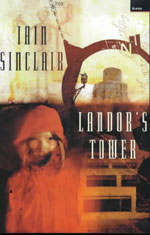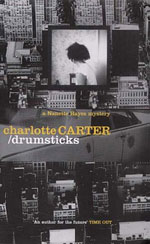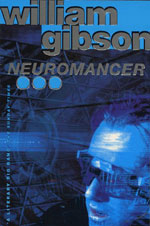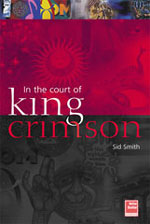Better Late Than Never
| |

| It's taken me 10 months to make it all the way through Iain Sinclair's Landor's Tower [Granta], and - as you can imagine, this isn't a good thing. Sinclair seems to have lost his touch and incoherently grouped a number of what appear to be excellent short prose pieces, full of his normal vigorous imagination and quirky occult/conspiracy-theory observations, within pages and pages of incoherent, inconsequential rambling and called it a novel. Now, as a publisher I'm vaguely up to speed on the book trade, but even so the kind of asides, in-jokes and dull observations offered here with regard to Hay-on-Wye and small press activities are of no interest or consequence; neither are much of the seemingly dope-fuelled observations regarding hippies and would-be-communities in the wilder parts of Wales. Ostensibly the book centres around a valley where various mystics &/or writers such as David Jones, Eric Gill, Bruce Chatwin, Allen Ginsberg and Father Ignatius all previously worked and lived, and the story of a writer sent - against his better wishes - to research and document the life of Walter Savage Landor. The writer is overtly self-deprecating, the plot simply not present and Sinclair's normal eye for detail and savage humour are sorely missing. I suspect it's to do with him abandoning his London setting and obsession; though he claims to have spent his childhood in Wales, much of the book is simply not-observed, much of the book simply misplaced ranting and cliché scene-shifting. Sinclair's next volume is reputed to be a walk around the M25, and I'm looking forward to that - Sinclair back on his beat, doing what he knows best, well away from the rural that seems to have momentarily diverted and stylistically unhinged him. |

| I've been momentarily diverted myself by a couple of Nanette Hayes mystery novels the erstwhile Serpent's Tail have recently published. Rhode Island Red and Drumsticks, both by Charlotte Carter, are supposedly jazz-tinged forays into New York. Ms Hayes, a self-described Grace Jones look-alike except for her ample and enchanting bosom, gets caught up in a couple of slowly unwinding stories. Said stories include their fair proportion of non-engaging sexual encounters, some hack club scenes and some 'jazz' busking and name-dropping [mainly mainstream bop jazz names] along with a couple of surly cops the likes of which we've all seen before. All mildly diverting and amusing for an hour or so before bedtime, but neither original enough nor knowledgeable enough to really cater for fans of murder mysteries or jazz music. I kept reading - apart from being sent them to review - mainly because they were set in New York and I like reading about where I've been. Oh, a note to the design department: when an author deliberately and specifically describes the main character, it's quite odd to put a totally different-looking woman on the front! But, I'm sticking to Lawrence Block for my New York mysteries from now on. |

| Better late than never, I guess, I've also recently read a couple of early William Gibson's, Neuromancer and Count Zero, also set in New York, I guess, also kind of mystery stories. Also, it seems to me, bluffing it on many fronts - in this case not jazz, but computers. Of course, I'm 20 years too late, and some of Gibson's 'vision' [or perhaps we should simply call it 'fiction'?] has kind of come true, but it's clear that Gibson is in many places winging it... I'm no computer buff ['far from it' I hear my friend Tim cry] but much of the substance of Gibson's novels simply doesn't hold up. Away from the computer terms of course, Gibson is basically writing a standard sub-Chandler detective novel, populated by what-now seem like very ordinary science fiction kind of characters. Of course, it's always a problem, isn't it, coming to something too late. I remember listening to Ziggy Stardust 10 years too late and it sounding like very ordinary rock; and my first exposure to the Velvet Underground also disappointed - what was this jangly pop stuff? Like much important art, say Picasso, it no longer holds the charge it once did, its influences have overtaken the original; and in many cases of course, Gibson's heirs seem much more inventive and, dare I say, better, writers: I'm thinking of the likes of Paul McCauley, Neal Asher, Ken MacLeod. But we mustn't forget where they got it all, or some of it, from; what gave them the freedom and vision to write their own thing in the first place. But strange how the originals now seem so tired and ordinary... Bang up to date are three music books I've enjoyed. Firstly a lightweight biography of Neil Young, Reflections in Broken Glass, by Sylvie Simmons, published in the Mojo Hero series. This skips and jumps through our erstwhile guitar heroes exploits in a mere 200 pages, telling us nothing new, but at least gathering it in one easy-to-reference place. |

| A heavier tome is Sid Smith's In the Court of King Crimson [Helter Skelter], as befits our finest prog rock soap opera, err, I mean band. Under Robert Fripp's iron-hand and direction, three, or is it four?, incarnations of King Crimson [each incarnation including several line-ups] have moved from mellotron excess to proto-new-metal, via improvised jazz, seventies rock-gamelan, and quirky 'double-trio' big band. Sid Smith has really gone to town tracking down and interviewing many of the members, and isn't afraid to let them voice their gripes and own opinions. [Only occasionally do you feel like shouting 'shut up' or 'stop whingeing' at some of them.] Only Fripp remains aloof from it all; and to my way of thinking Smith seems to feel unable to discuss or criticize Fripp in quite the same way he writes about many of the other Crim members. Of course, Fripp is discussed, berated, adored and hated by many of those speaking throughout the book, but the author himself seems strangely afraid to take on the one who is clearly the guiding spirit of the band - however much he claims not to be. As well as the biographical sagas detailed throughout the book, there's also a track-by-track discussion of all the official releases and much live performance. It's a must if you're at all interested in the band. And finally, Da Capo's Best Music Writing 2001, this year edited by Nick Hornby. You may remember I raved about the 2000 edition some time back, and though this isn't quite as good as that edition, it's still pretty damn good. It starts with the amusing and inventive 'Rock Snob's Dictionary' and then spreads its net wide to cover hip-hop, rock, country, rock and pop. Robert Gordon's memoir of Jeff Buckley is particularly fine, so is Jonathan Lethem's 'Not a Go-Betweens Piece: A Letter from Jonathan Lethem, on his Favourite Band'. But these are the kind of pieces you expect to find, and you know will hold your interest if you're interested in the music concerned. More intriguing are - if you're prepared to open up and read through the whole anthology, as I'd urge you to do - are those articles discussing or engaging with stuff you don't like, or listen to. Carly Carioli intelligently explores the troubled 'Napster Nation', Gilber Garcia discusses 'The Tao of Estaban', whilst further on there are intriguing essays on Johnny Cash, Django Reinhardt and Billie Holiday, nestled alongside a piece on Sleater-Kinney and another on auditing the books of a small, self-run, record company and musical agency! My only gripe is that the book only selects from North American writing, but apart from that quibble, I can't fault the second installment of this annual publication. © Rupert Loydell 2001 |